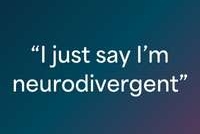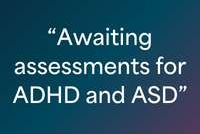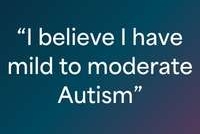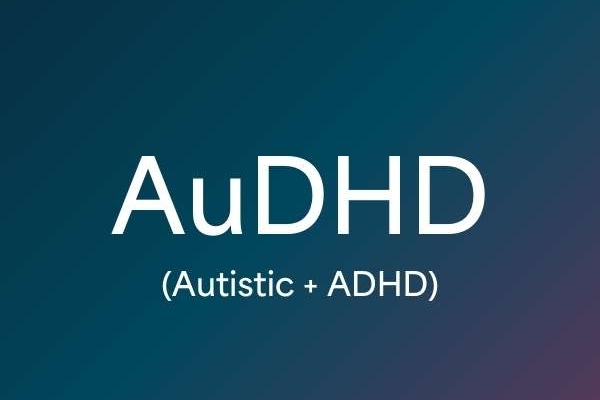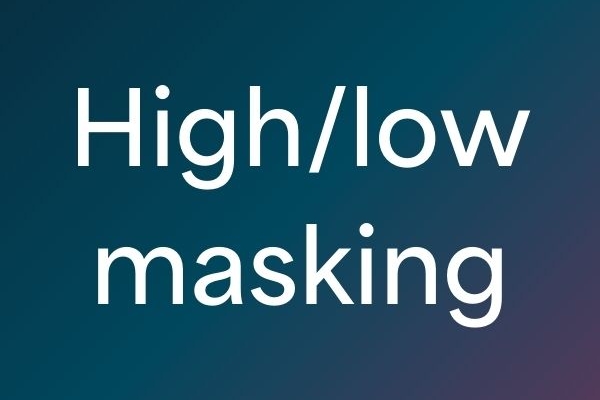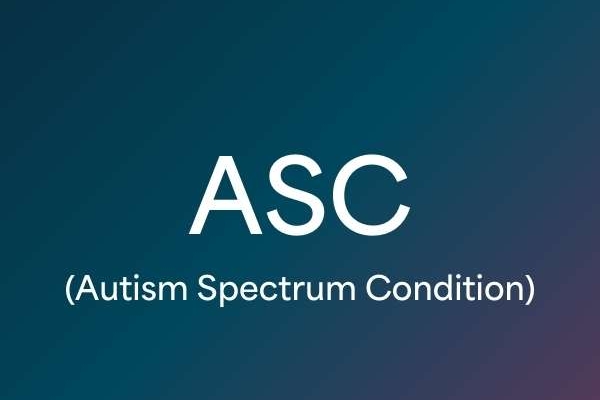
Understanding and Responding to Local Neurodivergent Needs
News posted: 18 March, 2025 Post by: Emily Edwards
Time to read: ~ minutes, give or take.
Listen to this blog post
Thank you!
I want to start by expressing my sincere thanks to everyone who took part in the survey. Your insights are shaping something that truly reflects our community’s needs.
Why This Matters
Neurodivergent people often experience the world in ways that differ from societal norms. Neuronormativity is the expectation that everyone’s brain works, learns, and communicates in the same way, or that there is one “right” way to be human. This kind of thinking is often centred around neurotypical ways of being in the world (because they tend to be in the majority) which then in turn shapes many of the systems we navigate daily which can contribute to barriers for those who think, perceive and/or process information differently.
Many existing support structures aren’t built with our [neurodivergent] needs in mind and so because i’d seen so many people posting locally online about finding support in and around Salisbury, in January 2025, I conducted a survey to better understand what people locally want and need from community support.
This survey was about listening, not assuming; I believe this is an essential first step in creating a space that genuinely works for people.
As one respondent put it:

I am sharing the highlights from this survey to give back to the community - so that we, as a collective, can better understand the needs of our diverse community and be empowered to take action. This isn’t just about what I can offer, but an opportunity for collaboration - to create the support, resources and opportunities that are truly needed.
If you have ideas for what we could build together, whether it’s a social space, a resource hub, or something else, please get in touch.
If you have an accessible space, or know of one, please let me know as currently the biggest barrier to me getting something off the ground is an accessible space close to Salisbury City Centre.
Remember, neurodiversity is about everyone, not just those with a diagnosis or a label; it includes neurotypical people. Communities are naturally diverse and that’s something i’m passionate about; lets celebrate differences together.
Number of Responses
There were 52 full responses and 20 partial responses to this survey (72 in total). While I’ve focused on the full responses for analysis, the partial responses were closely aligned with the full dataset.
The fact that the survey received both full and partial responses may offer a valuable insight. Some respondents shared very detailed preferences, while others engaged with only part of the survey, this in itself may indicate a need for low-pressure, low-commitment options. It’s not only children that benefit from a low-demand approach.
Who Responded & Key Themes
Neurotypes
The responses to this survey reflect a broad mix of neurotypes. Most people identified as Autistic, ADHD and Dyspraxic with Mental Health conditions frequently mentioned.
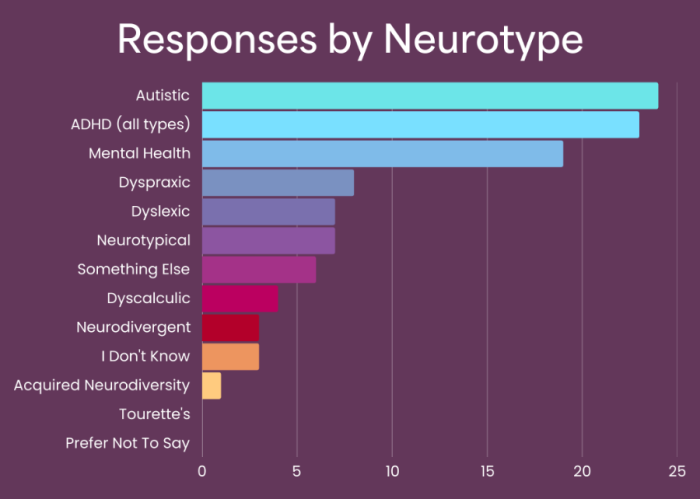
Many respondents also shared that they were still questioning their neurotype or had co-occurring conditions, highlighting what is often the reality that this is the rule rather than the exception.
The most common co-occuring conditions were:
- Autistic with Mental Health needs
- Autistic and ADHD (AuDHD)
- ADHD with Mental Health needs
- Autistic and Dyslexic
- Dyspraxic with Mental Health needs
We need to shape support and services to the unique needs of each individual. People mentioned experiences such as social anxiety, aphantasia, Severely Deficient Autobiographical Memory (SDAM), and mild learning disabilities. Others expressed uncertainty about their neurotype or identified in ways that felt most meaningful to them:
This diversity in self-identification reinforces the importance of creating spaces that are inclusive and flexible, allowing people to engage with support in ways that best fit their own developing understanding of themselves using language that works well for them.
Affirming language and terminology
As neurodiversity is about empowering individuals, it’s important to use language that is affirming and inclusive and I know from experience that this can be very personal and nuanced. Therefore in the survey, I asked:
Are there any terms or language you prefer or find more affirming when discussing neurodiversity and different neurotypes?
Many respondents (44%) had no specific language preferences, or were unsure highlighting that language around neurodiversity is still evolving for some. Here are some other terms which were mentioned multiple times:
Some language was met with hesitation, for example, one respondent for example shared that their child does not relate to superpower framing, showing that not all affirming language resonates in the same way. Others expressed a desire to learn more about inclusive terminology, wanting guidance to ensure they are using language that reflects neurodivergent experiences accurately and respectfully.
What kind of people responded?
The majority of respondents were neurodivergent individuals, parents or carers of neurodivergent young people, or both. As a neurodivergent parent of a neurodivergent young person, I know from lived experience that those who are both neurodivergent themselves and parenting a neurodivergent child often have distinct needs that differ from either group alone.
Only 1 person identified as a service provider, and no employers responded, indicating a gap in professional and workplace engagement with neurodivergence.
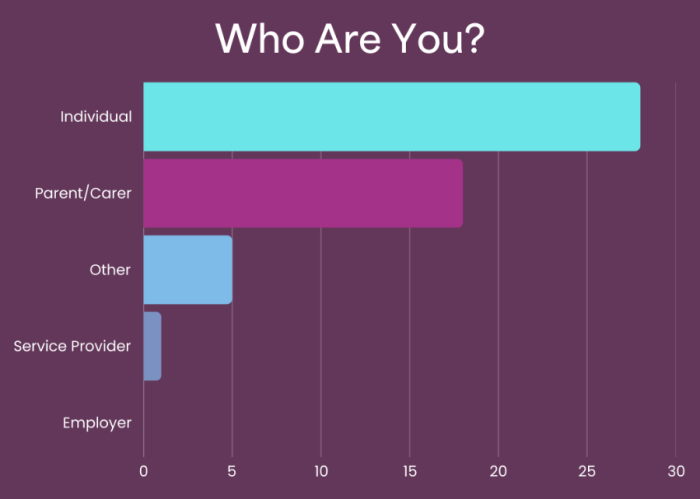
A small number of people identified as neurotypical, stating that they were seeking understanding or support for a family member.
Preferred Support Types & Location
Just over half of respondents preferred Salisbury City Centre with places like Amesbury, Harnham, Wilton and Laverstock also mentioned. Other preferred options included a hybrid (in-person/online) approach.
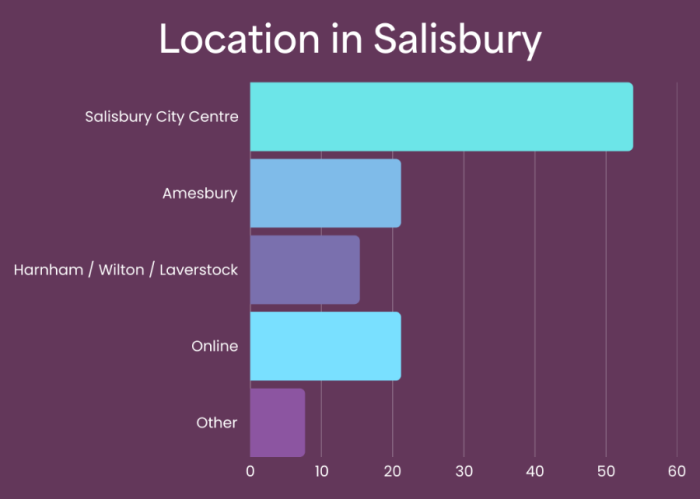
Other areas mentioned were Bemerton Heath, Warminster, Romsey, and Chalke Valley.
So far it is proving a challenge finding an accessible venue to hold events/workshops. If you have or know of an accessible space for hire in Salisbury City Centre please let me know.
Motivations for seeking support
Recent research on neurodiversity in the workplace highlights the importance of social connection, stress management, and self-understanding when creating inclusive environments. This survey reflects these same priorities, with people seeking local support to build friendships, navigate challenges, manage burnout, and better understand themselves and their diagnoses.
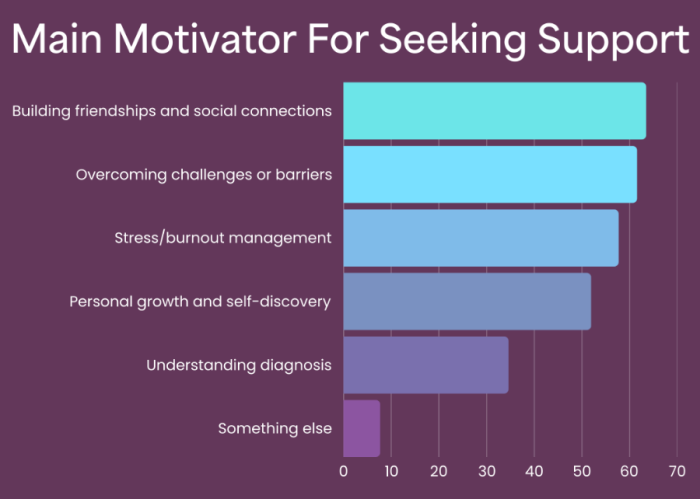
Other reasons included support with school and understanding what kind of support and resources someone with ADHD would benefit from.
One respondent summed it up well:

What kind of support do people need?
A Safe, Social Space
- Many respondents were not looking for ‘services’ in the traditional sense but for community and belonging.
- Informal social groups were the most requested type of support.
- Some people wanted structured sessions, while others preferred free-flowing meet-ups.
- Parents also expressed a need for a safe space for neurodivergent children and their families.
I’ve been looking for a group for ages that’s a safe setting for me and my 4-year-old.
More Flexible, Accessible Environments
- Outdoor spaces were mentioned as preferable to indoor environments for some.
- People wanted venues with good transport links and sensory-friendly spaces.
- Photos and clear instructions on accessing venues were suggested as useful.
More Community Awareness & Understanding
- Some respondents wanted support in advocating for themselves and their children.
- Others sought workplace and professional education on neurodiversity.
- Parents of neurodivergent children highlighted the need for more school support.
My experience when my son was in school was that my concerns were dismissed and trivialised. Something like this would really help validate parents.
Financial Barriers & Pricing Uncertainty
- Many respondents were unsure how much support should cost.
- Some needed low-cost or funded options, while others were willing to pay but didn’t know what was reasonable.
- A tiered or ‘pay what you can’ model was suggested as an inclusive approach.
I understand that money has to come from somewhere, but I can’t help but think of how neurotypical people can get free support through the NHS.
What I’ll Be Offering in Response
These findings have shaped what I’m going to offer next. I want to provide options that match the needs and preferences people have shared.
Therefore, I’ll be launching a series of accessible group coaching opportunities (details to be shared soon) as well as online webinars as a chance to explore key topics in a low-commitment, affordable and accessible way.
Neurodiversity & Menopause: A Space to Share Your Experience
Sarurday 26th April 2025, 11am - 12.30pm, Wilton
Join a facilitated group conversation to share your experiences in a safe, supportive space.
This event is for any neurodivergent person whether diagnosed or not - you do not need to have a formal diagnosis to attend, self-identification is welcome. We’re especially interested in hearing from autistic and/or ADHD individuals about your experiences.
Through self-reflection and hearing from others, you may gain new insights into your own journey. Your contributions will help shape an upcoming webinar on neurodiversity and hormones, where we’ll highlight real voices and lived experiences.
Please note:
- The session may be recorded using Otter, transcription software and anonymised quotes may be used.
- You’ll be asked to consent to recording and use of your words for this purpose as you book your ticket.
Neurodiversity & Hormones: Understanding the Connection
Tuesday 20th May 2025, 7pm - 8.30pm, Online via Zoom
Understand more about the impact of hormones on neurodivergent people, especially those who are Autistic and/or ADHD.
This webinar is for:
• Neurodivergent individuals looking to understand how hormones influence their brains.
• Employers and workplace allies wanting to create a more supportive and inclusive environment.
• Parents, educators, and caregivers supporting neurodivergent individuals through hormonal shifts.
You will gain a better understanding of the impact of hormones on neurodivergent people, especially those who are Autistic and/or ADHD.
This webinar will include:
- Live Q&A
- Recording
- PDF resource booklet
Social Get Togethers - Community, Connection, Conversation
First Tuesday of the month, April (1st) and May (6th) 7pm to 9pm
Location: Everyman Cinema, 17 Endless Street, Salisbury, SP1 1DP
A relax, informal social space where neurodovergent people can connect and chat. These 2 events taking place in April and May will be used as a pilot to see how it works for people and any future dates will be shaped by these alongside feedback from attendees.
No need to book, just come along. We'll be in the room by the window on the left as you enter the building.
Comments are closed on this post.


